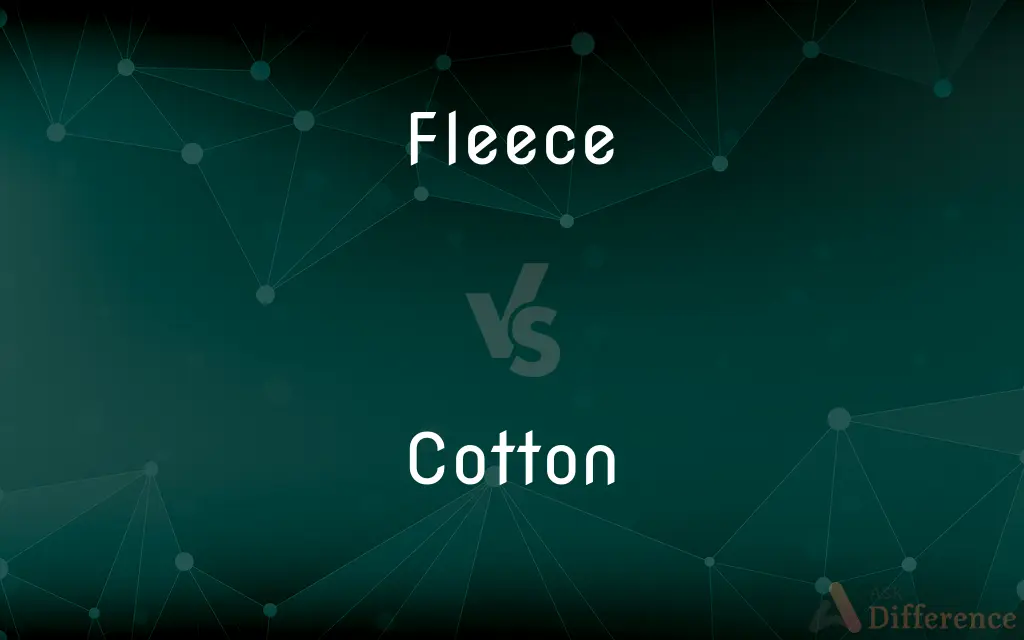Fleece vs. Cotton — What's the Difference?
By Fiza Rafique & Maham Liaqat — Published on February 19, 2024
Fleece is a synthetic fabric known for warmth and softness, often used in winter clothing. Cotton is a natural fiber, breathable and comfortable, used in a variety of garments.

Difference Between Fleece and Cotton
Table of Contents
ADVERTISEMENT
Key Differences
Fleece and Cotton are two materials widely used in the textile industry, each with unique properties and uses. Fleece, a synthetic fabric, is celebrated for its exceptional warmth and soft texture, making it a favorite for cold-weather apparel like jackets and blankets. Cotton, on the other hand, is a natural fiber that boasts breathability and comfort, making it versatile for everything from casual wear to bed linens.
The production process of Fleece and Cotton significantly differs, reflecting their distinct characteristics. Fleece is typically made from polyester, designed to mimic the warmth of wool while being lighter and less expensive. Cotton is harvested from the cotton plant, and its fibers are spun into yarns that are then woven or knitted into fabrics, offering a natural, soft feel that is hard to replicate synthetically.
In terms of environmental impact, Fleece and Cotton present different considerations. The production of fleece involves petrochemicals and can release microplastics into the environment, raising concerns about pollution. Cotton, while natural, requires significant amounts of water to grow, and non-organic cotton farming uses pesticides, which can harm the environment. Organic cotton offers a more sustainable alternative, minimizing harmful inputs.
When it comes to care and maintenance, Fleece and Cotton again diverge. Fleece is easy to care for, resistant to shrinking, and dries quickly, but it can pill over time. Cotton is known for its durability and ease of washing, but it can shrink if not pre-treated and may wrinkle easily, requiring more ironing.
The choice between Fleece and Cotton often comes down to the intended use and personal preference. Fleece is preferred for activities in colder conditions where insulation is key, while cotton is favored for everyday wear and in warmer climates due to its breathability and moisture-wicking properties.
ADVERTISEMENT
Comparison Chart
Material Origin
Synthetic, usually made from polyester
Natural, harvested from the cotton plant
Texture & Warmth
Soft and warm, ideal for cold weather
Soft and breathable, suitable for all climates
Environmental Impact
Involves petrochemicals, can release microplastics
Requires water and pesticides; organic options available
Care & Maintenance
Easy to care for, resistant to shrinking, can pill
Durable, can shrink and wrinkle, easy to wash
Preferred Use
Winter clothing, insulation
Everyday wear, warm weather clothing
Compare with Definitions
Fleece
Used in performance wear for insulation.
My fleece-lined leggings are perfect for cold morning runs.
Cotton
A natural fiber from the cotton plant.
The cotton dress was perfect for the summer day.
Fleece
A synthetic fabric known for its warmth.
My fleece jacket kept me warm throughout the winter hike.
Cotton
To give the appearance of being dotted with cotton balls.
Fleece
Soft and fluffy textile material.
The fleece blanket was so soft, I fell asleep instantly.
Cotton
Requires more water to produce than synthetic fibers.
Despite its water-intensive cultivation, cotton remains popular.
Fleece
Easy to care for and quick-drying.
After washing, my fleece pullover dried in no time.
Cotton
To take a liking; attempt to be friendly
A dog that didn't cotton to strangers.
An administration that will cotton up to the most repressive of regimes.
Fleece
A soft woolly covering or mass.
Cotton
(transitive) To provide with cotton.
Fleece
To deprive of a fleece, or natural covering of wool.
Cotton
Breathable and comfortable fabric.
I always choose cotton shirts for their breathability.
Fleece
Lightweight and durable fabric.
This fleece vest is lightweight yet provides ample warmth.
Cotton
Versatile for a wide range of garments.
From jeans to t-shirts, cotton is my go-to fabric.
Fleece
(countable) A textile similar to velvet, but with a longer pile that gives it a softness and a higher sheen.
Cotton
Can be organic, reducing environmental impact.
I prefer buying organic cotton to support sustainable practices.
Fleece
The wool of a sheep or similar animal
Cotton
Any of various shrubby plants of the genus Gossypium, having showy flowers and grown for the soft white downy fibers surrounding oil-rich seeds.
Fleece
The coat of wool of a sheep or similar animal.
Cotton
The fiber of any of these plants, used in making textiles and other products.
Fleece
The yield of wool shorn from a sheep at one time.
Cotton
Thread or cloth manufactured from the fiber of these plants.
Fleece
A soft, warm, lightweight, usually synthetic fabric with a deep pile, used primarily for clothing and blankets.
Cotton
Any of various soft downy substances produced by other plants, as on the seeds of a cottonwood.
Fleece
A garment, especially a shirt or jacket, made of such fabric.
Cotton
To come to understand. Often used with to or onto
"The German bosses ... never cottoned to such changes" (N.R. Kleinfield).
Fleece
To defraud of money or property; swindle.
Cotton
Gossypium, a genus of plant used as a source of cotton fiber.
Fleece
To shear the fleece from.
Cotton
Any plant that encases its seed in a thin fiber that is harvested and used as a fabric or cloth.
Fleece
To cover with a fleece or similar covering.
Cotton
Any fiber similar in appearance and use to Gossypium fiber.
Fleece
(uncountable) Hair or wool of a sheep or similar animal
Cotton
(textiles) The textile made from the fiber harvested from a cotton plant, especially Gossypium.
Fleece
(uncountable) Insulating skin with the wool attached
Cotton
(countable) An item of clothing made from cotton.
Fleece
(countable) An insulating wooly jacket
Cotton
Made of cotton.
Fleece
(roofing) Mat or felts composed of fibers, sometimes used as a membrane backer.
Cotton
To supply with a cotton wick.
Fleece
Any soft woolly covering resembling a fleece.
Cotton
To fill with a wad of cotton.
Fleece
The fine web of cotton or wool removed by the doffing knife from the cylinder of a carding machine.
Cotton
(horticulture) To wrap with a protective layer of cotton fabric.
Fleece
(transitive) To con or trick (someone) out of money.
Cotton
To cover walls with fabric.
Fleece
(transitive) To shear the fleece from (a sheep or other animal).
During spring shearing we have to fleece all the sheep in just a few days.
Cotton
(tar and cotton) To cover with cotton bolls over a layer of tar (analogous to tar and feather )
Fleece
(transitive) To cover with, or as if with, wool.
Cotton
To make or become cotton-like
Fleece
The entire coat of wool that covers a sheep or other similar animal; also, the quantity shorn from a sheep, or animal, at one time.
Who shore meLike a tame wether, all my precious fleece.
Cotton
To raise a nap, providing with a soft, cottony texture.
Fleece
Any soft woolly covering resembling a fleece.
Cotton
To develop a porous, cottony texture.
Fleece
The fine web of cotton or wool removed by the doffing knife from the cylinder of a carding machine.
Cotton
To enshroud with a layer of whiteness.
Fleece
To strip of money or other property unjustly, especially by trickery or fraud; to bring to straits by oppressions and exactions.
Whilst pope and prince shared the wool betwixt them, the people were finely fleeced.
Cotton
To protect from harsh stimuli, coddle, or muffle.
Fleece
To spread over as with wool.
Cotton
To rub or burnish with cotton.
Fleece
Tanned skin of a sheep with the fleece left on; used for clothing
Cotton
To get on with someone or something; to have a good relationship with someone.
Fleece
A soft bulky fabric with deep pile; used chiefly for clothing
Cotton
A soft, downy substance, resembling fine wool, consisting of the unicellular twisted hairs which grow on the seeds of the cotton plant. Long-staple cotton has a fiber sometimes almost two inches long; short-staple, from two thirds of an inch to an inch and a half.
Fleece
Outer coat of especially sheep and yaks
Cotton
The cotton plant. See Cotten plant, below.
Fleece
Rip off; ask an unreasonable price
Cotton
Cloth made of cotton.
Fleece
Shear the wool from;
Shear sheep
Cotton
To rise with a regular nap, as cloth does.
It cottons well; it can not choose but bearA pretty nap.
Cotton
To go on prosperously; to succeed.
New, Hephestion, does not this matter cotton as I would?
Cotton
To unite; to agree; to make friends; - usually followed by with.
A quarrel will end in one of you being turned off, in which case it will not be easy to cotton with another.
Didst see, Frank, how the old goldsmith cottoned in with his beggarly companion?
Cotton
To take a liking to; to stick to one as cotton; - used with to.
Cotton
Silky fibers from cotton plants in their raw state
Cotton
Fabric woven from cotton fibers
Cotton
Erect bushy mallow plant or small tree bearing bolls containing seeds with many long hairy fibers
Cotton
Thread made of cotton fibers
Cotton
Take a liking to;
Cotton to something
Common Curiosities
What is fleece made of?
Fleece is primarily made of polyester, a synthetic fiber.
Is cotton suitable for all weather types?
Cotton is versatile and suitable for warm weather due to its breathability, but less insulating in cold weather.
Can both fleece and cotton be used in outdoor gear?
Yes, both materials are used in outdoor gear; fleece for insulation and cotton for comfort in warmer conditions.
Can fleece keep you warm in extreme cold?
Yes, fleece is designed for warmth and can be effective in extreme cold, especially as an insulation layer.
Is fleece or cotton better for sensitive skin?
Cotton is generally better for sensitive skin due to its natural fibers, whereas fleece is synthetic.
Is fleece cheaper than cotton?
The cost can vary, but fleece is often less expensive to produce than organic cotton.
Does fleece have an environmental impact?
Yes, fleece can release microplastics during washing, which can contribute to environmental pollution.
Do fleece and cotton both absorb moisture?
Cotton absorbs moisture well, while fleece is hydrophobic but can wick moisture away from the body.
Is cotton sustainable?
Cotton can be sustainable, especially when grown organically, which reduces water and chemical use.
Can fleece be waterproof?
Fleece itself is not waterproof but can be treated or paired with other materials to provide water resistance.
Are fleece and cotton hypoallergenic?
Cotton is naturally hypoallergenic; fleece is generally considered non-irritating, but its synthetic nature may affect sensitive individuals.
Can fleece be recycled?
Yes, fleece made from polyester can be recycled, though recycling processes vary in availability.
How do you care for cotton garments?
Cotton garments can be machine washed and dried, but may require ironing and can shrink if not pre-treated.
What are the main reasons to choose cotton over fleece?
Choose cotton for its natural breathability, comfort, and suitability for sensitive skin and warmer climates.
Why choose organic cotton?
Organic cotton is chosen for its reduced environmental impact, avoiding the use of harmful pesticides and chemicals.
Share Your Discovery

Previous Comparison
Juneteenth Day vs. MLK Day
Next Comparison
Past vs. Past PerfectAuthor Spotlight
Written by
Fiza RafiqueFiza Rafique is a skilled content writer at AskDifference.com, where she meticulously refines and enhances written pieces. Drawing from her vast editorial expertise, Fiza ensures clarity, accuracy, and precision in every article. Passionate about language, she continually seeks to elevate the quality of content for readers worldwide.
Co-written by
Maham Liaqat













































